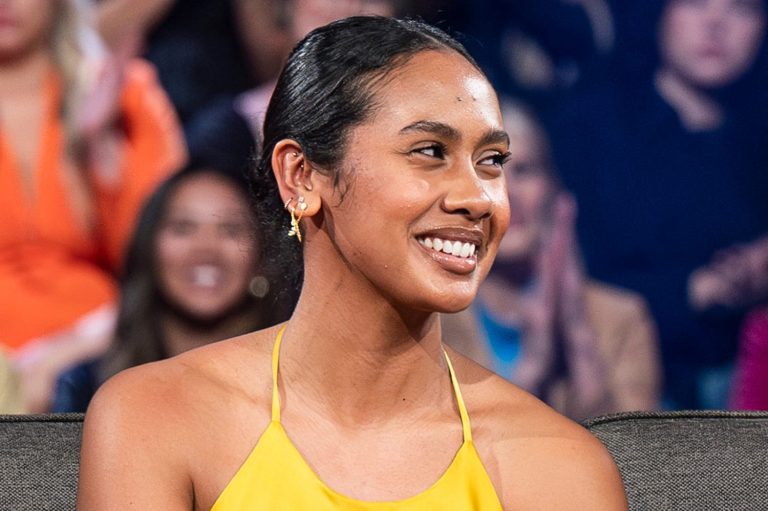Despite being called a “jungle Asian” and other racist slurs by fans of ABC's “The Bachelor,” contestant Rachel Nance, who is Asian and black, says she refuses to dilute any aspect of her heritage.
Nance, whose mother is Filipina and whose father is black and Arab, was among the top three contestants for the season that ended last week. The online hate was particularly fierce after an episode in which her family shared their Filipino traditions. But the 26-year-old told NBC News this week that none of that has changed the pride she feels in her cultures.
Nance said that while many women of color would be expected to whitewash their experiences to make others feel more comfortable, she would do no such thing.
“Being a woman, you're really put in a box, and being a woman of color, you're put in a smaller box and we can't win,” Nance said. “Either I honor my family and show what I grew up with, or I don’t and back away, then get sad and don’t honor my family.”
She chose the first option, “And I think that's all you can do – you just show who you are.”
Nance was one of 32 women who appeared on season 28 of the popular show to compete for the heart of Bachelor Joey Graziadei. Nance said she was appalled by fans' comments after the Week 8 episode, in which Graziadei, 28, visited the hometowns of the top four contestants. Although Nance grew up in Hawaii, her hometown date happened in Rancho Cucamonga, California, where her family introduced graziade to many Filipino customs, including feasting on lechon, a crispy roasted pig, and tinikling, a traditional dance in which dancers do jumping jacks. And the step. Spinning between two bamboo poles clapped together on the ground.
While Nance made it to the following week, where he received a rose over fellow contestant Maria Gorgas, some viewers disagreed with Graziadei's choice. Others criticized Nance for questioning Gorgas' intentions in pulling Graziadei aside before the rose ceremony. But, as she first pointed out in a Women Tell All special that aired last month, a large number of social media users resorted to racist slurs and derogatory comments about her skin color. Nance said some claimed she had “overdone the culture.”
“I think this is my norm, not theirs. They thought I was doing too much,” she said. “I'm so proud of my family that we decided to show our identity. … I don't regret doing it.”
She said other criticism focused on the racial nature of her relationship with Graziadei. Since the episode aired, Nance said she's come across TikToks from people expressing their disgust at the pair kissing.
“I wouldn't change who I fall in love with,” she said. “My family is an interracial couple. My cousins are in interracial relationships. I think it's a very beautiful thing that my family is a melting pot as well.”
Nance, who grew up largely in Hawaii, said she was surrounded by multicultural and mixed-race families who often celebrated their backgrounds. But when she moved to the East Coast for college, she said she began to feel the weight of discrimination.
“It was just those little looks I would give,” Nance said, adding that her previous interracial relationships would elicit hurtful comments or looks. “I remember one time I was in the grocery store and this lady was like, ‘Shame on you, you guys are together.’ When I was a nurse’s assistant, I would ask people to call me the N-word.
When racist criticism reached its peak after the season aired, Nance said she felt she had to say something. But she said that deciding to speak out as a woman of mixed Asian heritage was not an easy choice. At one point, she had second thoughts about discussing the matter on the “Women Tell All” special.
“Asian women, we're taught to always apologize first. … 'If I bump into someone, I say, 'Oh, sorry. Sorry.' “If they bump into me, I say, ‘Sorry.'” “You never want to appear too loud or like you're doing too much,” she said. So, in a split second before I got on stage, I thought maybe I shouldn't talk about this. So what if it makes people uncomfortable?
However, Nance said she was not interested in maintaining the status quo.
“Continued silence means perpetuating the same toxic cycle,” she said. “I hope from what I've shared, that people of color, Asian women, all of us — will not use discrimination and racism as a crutch, but as a catapult to push us in a direction, to chase our dreams, to take up space.”
With the announcement of fellow contestant Jen Tran as the next Bachelorette — the first Asian American lead in the show's sister franchise — Nance said it will be a defining moment for Asian American women.
“We now have this huge platform. By me sharing my story and being the Bachelorette, it opens more doors and people can break through those barriers in Hollywood and reality TV,” Nance said. “People will have no choice but to accept.”

